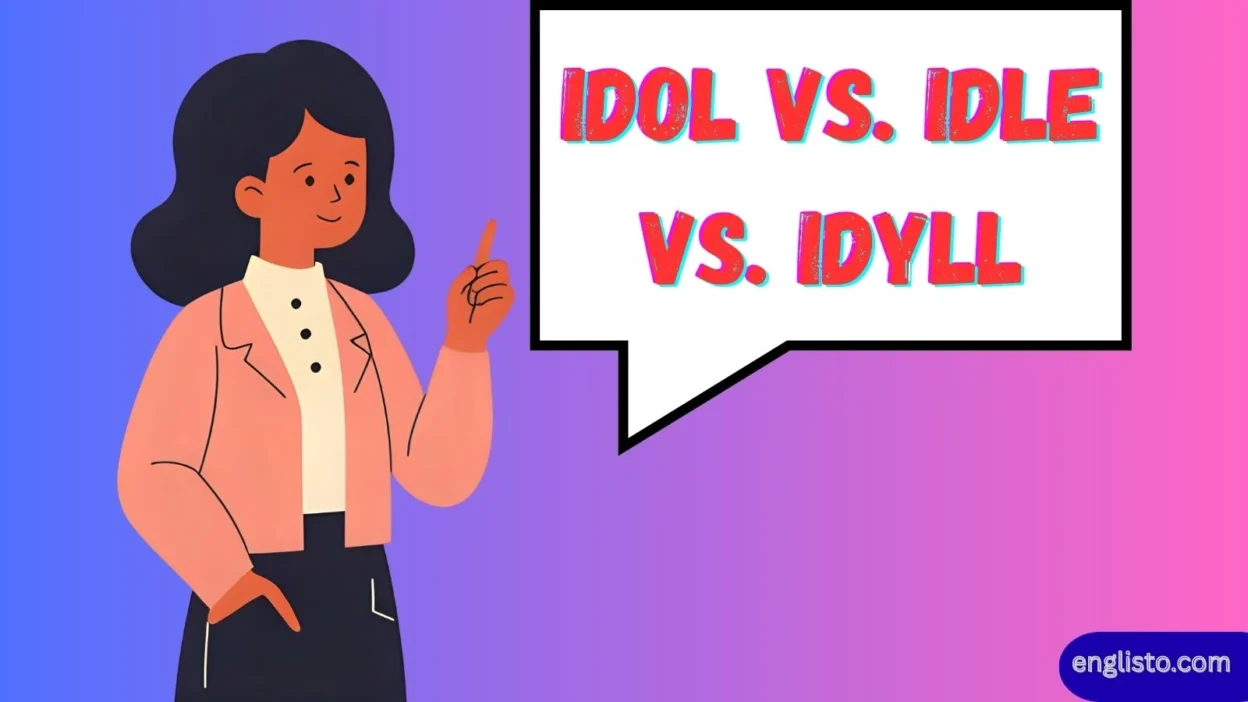Words that sound alike but mean entirely different things can trip up even fluent English speakers. Idol, idle, and idyll fall into this category. They share nearly identical pronunciation (usually /ˈaɪ.dl/), yet their meanings couldn’t be further apart—ranging from worship and reverence to laziness to poetic tranquility. Idol vs. Idle vs. Idyll.
This guide will walk you through the subtle differences, give you grammar rules, usage examples, and mnemonic tricks, and even compare them in tables for clarity. By the end, you’ll not only understand each word but also use them with confidence in your writing, speaking, or even when decoding literature.
What Makes “Idol,” “Idle,” and “Idyll” Confusing?
Homophones are like linguistic twins—alike in sound but carrying different identities. These three are particularly tricky because:
- They all trace back to Greek or Old English roots.
- Their meanings often show up in literature, pop culture, and everyday conversation.
- A simple spelling slip can completely change the tone of a sentence.
“The engine sat idle in the driveway, while his childhood idol played on the radio, creating a perfect summer idyll.”
One word mix-up and the beauty of that sentence collapses.
Read More: Good Morning [Name]: Is There a Comma After “Good Morning”?
The Word “Idol” – Worship, Fame, and Admiration
At its core, idol refers to an object of devotion or someone who is deeply admired. It’s loaded with cultural, religious, and modern celebrity connotations.
Meanings of Idol
- Religious: A statue or effigy representing a god or deity.
- Cultural: A person revered—think pop stars, sports champions, or Hollywood icons.
- Metaphorical: Anything excessively admired, even brands or products.
| Context | Example Sentence | Synonyms |
| Religion | “The temple housed a golden idol.” | effigy, deity, carving |
| Celebrity | “Beyoncé is an idol to millions of fans.” | icon, hero, paragon |
| Figurative | “For some, money becomes an idol.” | symbol, obsession |
Famous References
- American Idol: Pop culture talent show shaping celebrity culture.
- Golden Calf (Biblical): Symbol of idolatry.
- Historical figures like Jack Dempsey (idolized in boxing) or Dietrich Bonhoeffer (writing against false idols).
Mnemonic Tip: Idol = I deal with admiration.
The Word “Idle” – Inactivity and Laziness
Idle is the opposite of action. It suggests being inactive, unoccupied, or pointless—sometimes neutral, often negative.
Meanings of Idle
- Literal inactivity: Engines idling, workers unoccupied.
- Laziness: A person avoiding responsibility.
- Worthlessness: Empty talk, gossip, or pointless effort.
| Context | Example Sentence | Synonyms |
| Machines | “The car engine was left idle in the driveway.” | tickover, running low |
| People | “He spent the afternoon idle, lounging in a hammock.” | lazy, inactive, unproductive |
| Speech | “They wasted time in idle chatter.” | trivial, vain, pointless |
Real-Life Contexts
- Workplace: Idle workers during strikes or downtime.
- Technology: Computers in idle mode.
- Everyday: Idling cars wasting fuel.
Proverbial Wisdom: “Idle hands are the devil’s workshop.”
Mnemonic Tip: Idle = I don’t labor.
The Word “Idyll” – Rustic Peace and Poetic Charm
Less common, but beautifully evocative, idyll means a short poem or prose piece describing peaceful, rustic life. It paints pictures of tranquility, nostalgia, and harmony.
Meanings of Idyll
- Literary: A pastoral poem, often idealizing rural life.
- Everyday: A short period of happiness or a serene interlude.
| Context | Example Sentence | Synonyms |
| Poetry | “The poet wrote an idyll about shepherds in the hills.” | pastoral, verse, vignette |
| Daily life | “Their honeymoon was a romantic idyll in the Riviera.” | interlude, retreat, bliss |
| Figurative | “She longed for an idyll away from city turmoil.” | utopia, haven, tranquility |
Literary Roots
- Origin: Greek eidyllion (meaning “little picture”).
- Theocritus (3rd century BCE) popularized pastoral idylls.
- Modern use: Describing blissful escapes—cottages, countryside, Hollywood romances.
Mnemonic Tip: Idyll = Ideal life.
Comparison Table: Idol vs. Idle vs. Idyll
| Word | Part of Speech | Core Meaning | Example | Tone |
| Idol | Noun | Worshiped figure or admired person | “Taylor Swift is her idol.” | Reverent, admiring |
| Idle | Adjective/Verb | Inactive, lazy, pointless | “The workers sat idle during the strike.” | Neutral to negative |
| Idyll | Noun | Peaceful poem or happy interlude | “The cottage holiday was a true idyll.” | Poetic, positive |
Common Mix-Ups and How to Avoid Them
- Idol vs. Idle:
- Idol = Hero or god.
- Idle = Not working.
- “An idol never sits idle.”
- Idol = Hero or god.
- Idle vs. Idyll:
- Idle = Wasting time.
- Idyll = Peaceful retreat.
- “Idle gossip ruins an idyll.”
- Idle = Wasting time.
- Idol vs. Idyll:
- Idol = Revered figure.
- Idyll = Perfect moment.
- “She met her idol in a countryside idyll.”
- Idol = Revered figure.
Real-World Usage Examples
- Pop Culture: “American Idol made stars out of ordinary singers.”
- Workplace: “The factory stood idle after the power outage.”
- Literature: “Wordsworth’s poetry often captured the spirit of an English idyll.”
Mnemonics & Memory Tricks
- Idol → Think “Icon.”
- Idle → Think “Idleness = Inactivity.”
- Idyll → Think “Ideal moment.”
You can even use a quick rhyme:
“An idol inspires, the idle expire, an idyll transpires.”
FAQs
Q1: Do “idol,” “idle,” and “idyll” sound exactly the same?
Yes, in most accents they’re pronounced alike: /ˈaɪ.dl/. Context and spelling clarify meaning.
Q2: Which word is most common?
“Idle” and “idol” appear often in everyday speech. “Idyll” is rarer, mainly in literature.
Q3: Is “idyll” always positive?
Generally, yes—it suggests happiness, peace, or beauty.
Q4: Can “idol” mean a false god?
Yes, in religious contexts, “idol” often has negative connotations of idolatry.
Q5: How do I avoid confusing them in writing?
Rely on meaning: Idol = admired figure, Idle = inactive, Idyll = ideal life/scene. Mnemonics help.
Conclusion
Idol, idle, and idyll may sound alike, but they each carry unique cultural, emotional, and literary weight. From idols worshiped in temples to idle engines in driveways to idylls written in verse, mastering these words enriches your vocabulary and prevents embarrassing mix-ups.
Remember the golden trio:
- Idol = Revered figure.
- Idle = Inactive state.
- Idyll = Ideal peaceful moment.
Use them wisely, and your writing (and conversations) will never sit idle again.



